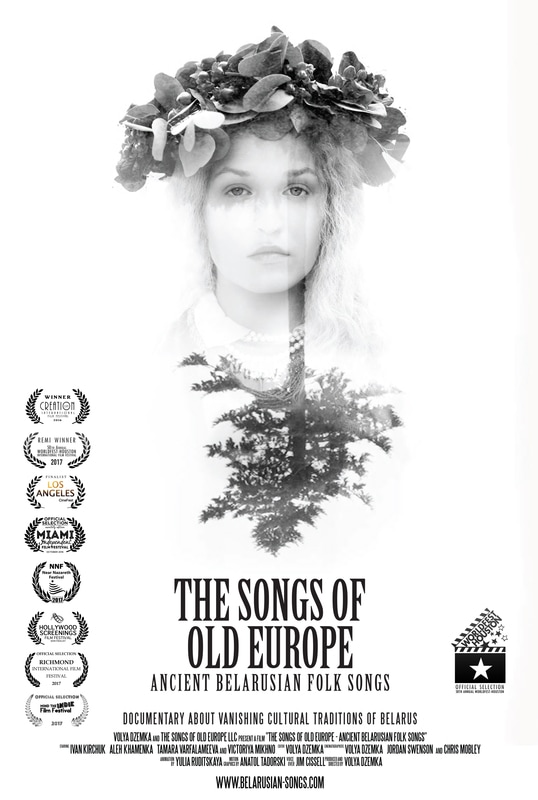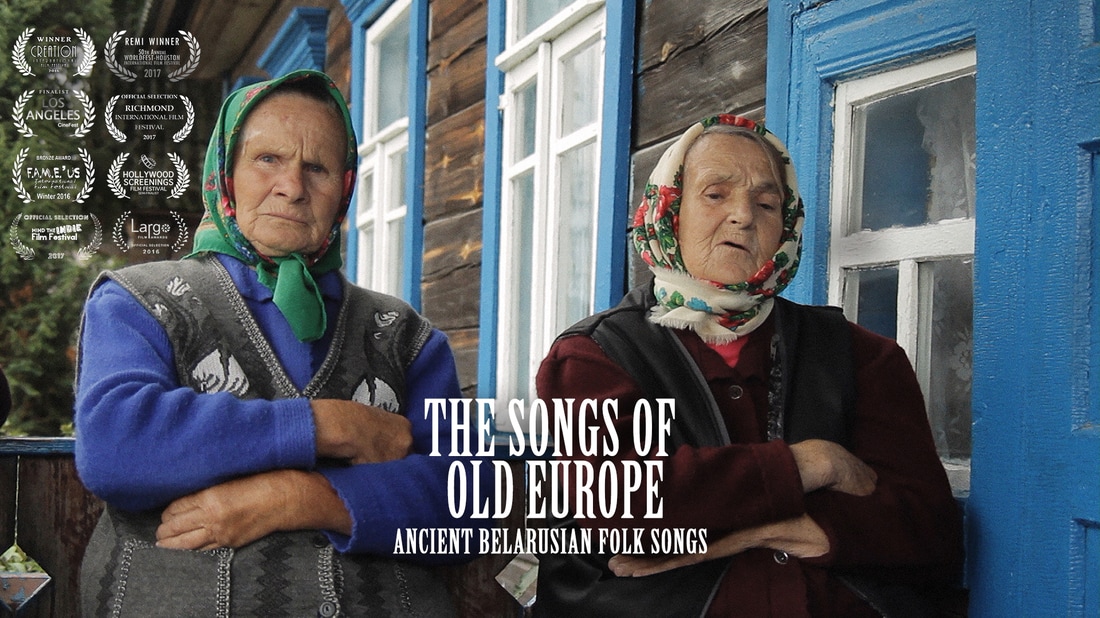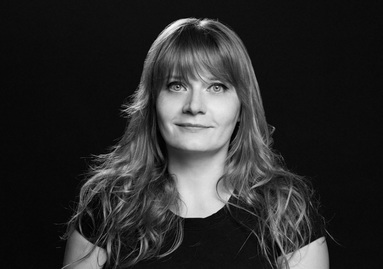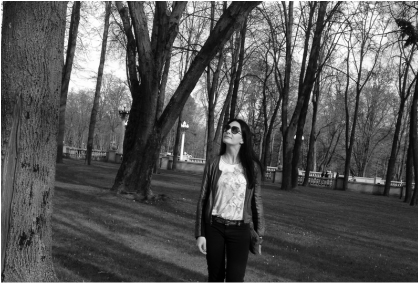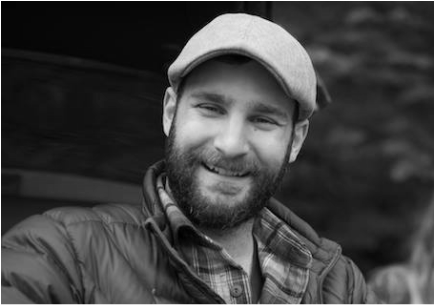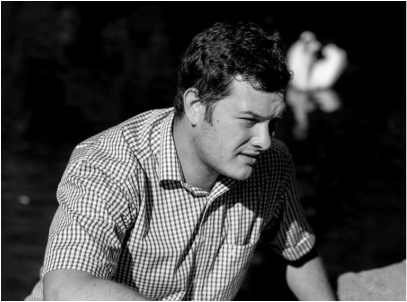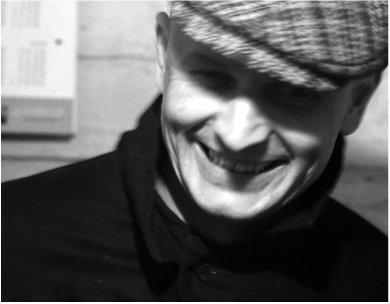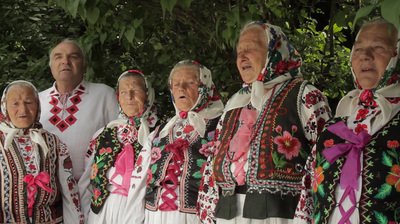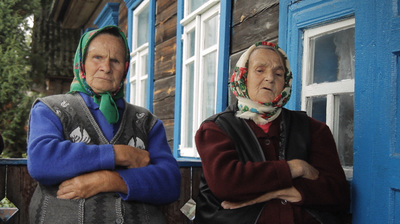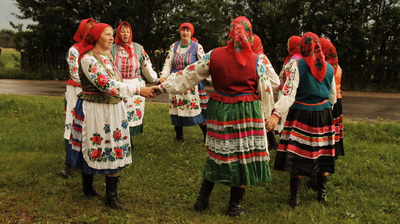|
For all press inquiries please, contact us.
To download press materials please, click here.
The Songs of Old Europe – Ancient Belarusian Folk Songs Documentary About Disappearing Cultural Traditions of Belarus WRITTEN, PRODUCED AND DIRECTED BY VOLYA DZEMKA |
MEDIA ARTICLES
Here's a short list of some of the media that has featured our documentary
News:
Literature and Culture (LIM, Zviazda In Belarusian) - June 6, 2018
Zviazda (In Belarusian on DVD Release) - May 5, 2018
Media Polesye (in Belarusian on Remi Award) - May 4, 2017
CTV.BY (in Russian on Remi Award) - May 3, 2017
Belta BY (in English on Remi Award) - May 2, 2017
Nasha Niva (in Belarusian on Remi Award) - May 2, 2017
Belnovosti (in Russian on Remi Award) - May 1, 2017
Velvet (Interview with Director in Belarusian) - April 20, 2017
Mediamusic Journal (Music on Listapad in Russian) - December 1, 2016
Media Polesye (In Belarusian on Screening at Listapad Film Festival) - November 9, 2016
Media Polesye (Interview with Director in Belarusian) - October 20, 2016
Belarusians and Market (Interview with Director in Russian) - September 25, 2016
BelarusFeed (in English on Best Documentary Award) - September 2, 2016
TUT.BY (in Russian on Best Documentary Award) - September 2, 2016
Culture (Review of the film In Belarusian) - June 6, 2016
Nasha Niva (in Belarusian) - April 7, 2016
Diasporanews (in Russian) - April 8, 2016
TUT.BY (in Russian) - April 6, 2016
Racyja (in Belarusian) - November 2015
Radio:
KXPM AM1540 Radio "Continent ", April 20, 2016, hosted by Igor Khais (in Russian)
MVRadio 97.4 FM Program "5 minutes", May 5th, 2016, hosted by Tamara Viatskaya (in Russian)
(Click here to listen)
(Click here to listen)
REVIEW IN JOURNAL OF AMERICAN FOLKLORE
Press Release:
Volya Dzemka fell in love with Belarusian folk songs when, as a student, she saw a group of young girls perform them. “My mind was immediately consumed by the unfamiliar harmonies, which are based on the ancient Greek musical scales.”
That fascination lead her to produce and direct The Songs of Old Europe – Ancient Belarusian Folk Songs, the first ever English-language documentary about Belarusian folk songs, considered by ethnographers to be the oldest unaltered songs in Europe. Dzemka is a native Belarusian who moved to Seattle in 2003, and who herself performs these songs with her local group, VOLYA (“freedom”).
The Republic of Belarus, a country of 9.5 million people that used to be part of the former Soviet Union, gained independence in 1991. Although struggling economically, Belarus is rich in culture. Isolation, caused by geography and government measures during the Soviet times that forced the Belarusians to stay in their villages, kept the singing tradition alive up until this day.
Belarusian folk songs are closely tied to rituals and seasons. Five hundred songs could be sung for one single wedding, from the day of the proposal until the wedding, which itself could last up to two weeks.
However, these songs and the people who sing them were looked down upon and mistreated, even in their own country. “It makes me sad that even Belarusians don’t realize the significance of their songs,” Dzemka says. “I want to tell the rest of the world that these songs are invaluable. They are to Belarus what the pyramids are to Egypt. That’s no exaggeration. Some Belarusian folk songs originated during the same time period as the Egyptian pyramids and Babylon culture.”
But change is coming fast. Political and economic shifts, technological progress and the devastation brought by the meltdown of the nuclear reactor in Chernobyl in 1986 have had an eroding effect on the Belarusian singing tradition. The folk songs are gradually disappearing, therefore making the documentary was a race against the clock.
Dzemka didn’t want to wait for funding. She financed the film with her day-time job as a translator at Microsoft, as well as other sources of income, including personal loans and a crowdfunding campaign on Indiegogo.
After writing the script in 2011, she set out to Belarus, driving hundreds of miles along windings roads and past swamps in the back country, to film groups of elderly women, called “babushkas”, singing their songs in rich, loud voices. The presence of an American filmmaker made the babushkas very excited. “They were so happy and proud to share their heritage. They treated me like family,” Dzemka says.
The 60-minute documentary offers an intimate, rare look into a very different world that has been isolated for centuries, and captures the bond between the women. “There are no listeners or spectators. All are participants. Singing was apart of life,” the narrator says, while the screen fills with joyfully dancing and singing villagers.
The topic, although traditional, has been infused with a contemporary, vivid style and originality – the history of Belarus and some song lyrics have been visualized through animation and graphics. The Songs of Old Europe also contains authentic footage from the early and late 1900’s, as well as battle scenes shot at different medieval festivals in Belarus.
Attentive viewers can even spot a local element: the opening scene was shot in Bremerton, Washington. It is the only area in Washington state that resembles Belarus, a forested country, with many lakes and swamps but no mountains.
And of course, there is music - a mix of ancient songs and modern versions of the songs, performed by groups such as Troitsa and Guda from Belarus.
Even some of the babushkas in The Songs of Old Europe have passed away, before they had the chance to see themselves on screen. “I’ve worked as hard as I can,” Dzemka says, “so our babushkas will be able to see the film and know that people around the world will talk about them and listen to their songs before it’s their time to go.”
Even more importantly, Dzemka has ensured that this piece of living history will stay alive.
Volya Dzemka fell in love with Belarusian folk songs when, as a student, she saw a group of young girls perform them. “My mind was immediately consumed by the unfamiliar harmonies, which are based on the ancient Greek musical scales.”
That fascination lead her to produce and direct The Songs of Old Europe – Ancient Belarusian Folk Songs, the first ever English-language documentary about Belarusian folk songs, considered by ethnographers to be the oldest unaltered songs in Europe. Dzemka is a native Belarusian who moved to Seattle in 2003, and who herself performs these songs with her local group, VOLYA (“freedom”).
The Republic of Belarus, a country of 9.5 million people that used to be part of the former Soviet Union, gained independence in 1991. Although struggling economically, Belarus is rich in culture. Isolation, caused by geography and government measures during the Soviet times that forced the Belarusians to stay in their villages, kept the singing tradition alive up until this day.
Belarusian folk songs are closely tied to rituals and seasons. Five hundred songs could be sung for one single wedding, from the day of the proposal until the wedding, which itself could last up to two weeks.
However, these songs and the people who sing them were looked down upon and mistreated, even in their own country. “It makes me sad that even Belarusians don’t realize the significance of their songs,” Dzemka says. “I want to tell the rest of the world that these songs are invaluable. They are to Belarus what the pyramids are to Egypt. That’s no exaggeration. Some Belarusian folk songs originated during the same time period as the Egyptian pyramids and Babylon culture.”
But change is coming fast. Political and economic shifts, technological progress and the devastation brought by the meltdown of the nuclear reactor in Chernobyl in 1986 have had an eroding effect on the Belarusian singing tradition. The folk songs are gradually disappearing, therefore making the documentary was a race against the clock.
Dzemka didn’t want to wait for funding. She financed the film with her day-time job as a translator at Microsoft, as well as other sources of income, including personal loans and a crowdfunding campaign on Indiegogo.
After writing the script in 2011, she set out to Belarus, driving hundreds of miles along windings roads and past swamps in the back country, to film groups of elderly women, called “babushkas”, singing their songs in rich, loud voices. The presence of an American filmmaker made the babushkas very excited. “They were so happy and proud to share their heritage. They treated me like family,” Dzemka says.
The 60-minute documentary offers an intimate, rare look into a very different world that has been isolated for centuries, and captures the bond between the women. “There are no listeners or spectators. All are participants. Singing was apart of life,” the narrator says, while the screen fills with joyfully dancing and singing villagers.
The topic, although traditional, has been infused with a contemporary, vivid style and originality – the history of Belarus and some song lyrics have been visualized through animation and graphics. The Songs of Old Europe also contains authentic footage from the early and late 1900’s, as well as battle scenes shot at different medieval festivals in Belarus.
Attentive viewers can even spot a local element: the opening scene was shot in Bremerton, Washington. It is the only area in Washington state that resembles Belarus, a forested country, with many lakes and swamps but no mountains.
And of course, there is music - a mix of ancient songs and modern versions of the songs, performed by groups such as Troitsa and Guda from Belarus.
Even some of the babushkas in The Songs of Old Europe have passed away, before they had the chance to see themselves on screen. “I’ve worked as hard as I can,” Dzemka says, “so our babushkas will be able to see the film and know that people around the world will talk about them and listen to their songs before it’s their time to go.”
Even more importantly, Dzemka has ensured that this piece of living history will stay alive.
TEAM
|
Director and Producer: Volya Dzemka
Born and raised in Minsk, Belarus, Volya now resides in Seattle, Washington. From 1998 to 2002 Volya studied Chemistry at the Belarusian State University. In 2010 she graduated from the Art Institute of Seattle with a degree in Photography, participated in a number of competitions and exhibits. She returned to the Art Institute and got her Bachelor’s degree in Fine Art, majoring in Digital Filmmaking and Video Production in 2018. Volya has worked as a producer, director, assistant director and cinematographer on a number of projects, such as short films, music videos and commercials. |
|
Animator: Yulia Ruditskaya
Yulia is based in Brooklyn, New York, and was born in Minsk, Belarus. Her whimsical style of animation has been screened at film festivals from Portugal to Japan, gaining wide recognition around the world. Yulia graduated from the Department of Design and Visual Communications at the Belarusian State University (Minsk, Belarus) and the School-Studio For Animated Film Direction SHAR (Moscow, Russia). Since 2003, Yulia has worked as а director, animator, illustrator and designer on various independent projects for brands, musicians, and educational and non-profit clients, with a focus on animated short film. She has also taught post-graduate animation courses and workshops. |
|
Cinematographer: Jordan Swenson
Jordan is an active cinematographer, editor, and colorist from Seattle, Washington. After high school he enlisted in the military, where he spent nine years, and served two combat tours in the Middle East. Jordan has since graduated with a Bachelor’s degree in Fine Arts, majoring in Digital Filmmaking and Video Production. He has worked on projects such as high-end television commercials, short narrative films of varying genres (action, comedy, drama, horror), music videos, corporate style videos, short documentary films, and experimental films. |
|
Cinematographer: Aleksandr Aleinikov
Director of Photography, teacher-organizer, photographer, Aleksandr was born in Minsk. He has graduated from Belarusian State Academy or Arts with a Bachelors’s degree, majoring in Directing of Motion Pictures and minoring camera operation. Since 2009 he has directed and worked as director of photography on several short films, television series, music videos, commercials, and his own creative projects. Aleksandr has a couple of international cinematography awards and diplomas from Warsaw, Moscow and Riga. Since 2010 he teaches cinematography at Andrey Polupanov film school-studio, conducts series of master classes for disabled at the workshop of social cinema. Aleksandr was one of the creators of an independent short film competition "Kinosprint"; he currently lives and works in Minsk, Belarus. |
|
Motion Graphics: Anatol Tadorski
Anatol is based in Brest, Belarus, and was born in village of Dzyatlavichy, Luninets district, Belarus. He graduated from the State Pedagogical University in Brest. Anatol is an artist who specializes in book illustrations and graphics, and his work has been shown in multiple exhibits. He also worked on various independent projects as an illustrator, animator and motion graphics artist. |
Credits
Directed, produced, written and edited by Volya Dzemka
Cinematography by Volya Dzemka, Jordan Swenson, Chris Mobley, Sara Mustelin, Aleksandr Aleinikov
Animation by Yulia Ruditskaya
Motion Graphics by Anatol Tadorski
The Songs of Old Europe – Ancient Belarusian Folk Songs was produced by Volya Dzemka and The Songs of Old Europe LLC, with additional funding provided by the generosity of 187 individual donors.
Directed, produced, written and edited by Volya Dzemka
Cinematography by Volya Dzemka, Jordan Swenson, Chris Mobley, Sara Mustelin, Aleksandr Aleinikov
Animation by Yulia Ruditskaya
Motion Graphics by Anatol Tadorski
The Songs of Old Europe – Ancient Belarusian Folk Songs was produced by Volya Dzemka and The Songs of Old Europe LLC, with additional funding provided by the generosity of 187 individual donors.
Click on the image to zoom in. 1. Folk group SVITANAK, Dzyatlavichy village. 2. Eva Pryhodzka and Hanna Sakalouskaya, Slabada village. 3. Folk group ZHURAVINKA, Slabada village.

